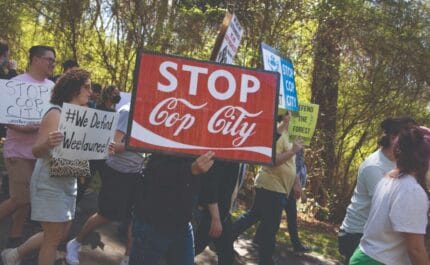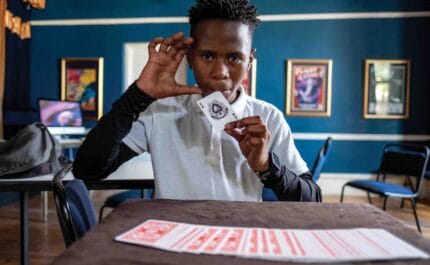Gangsters’ Paradise?
On 1st July 2014, the new president of Panama made an offer to the country’s gangsters: sever your ties with criminals and we’ll welcome you back to civic life – and pay you for your trouble. But as Jeff Campagna discovered, Juan Carlos Varela’s amnesty scheme hasn’t been a complete success
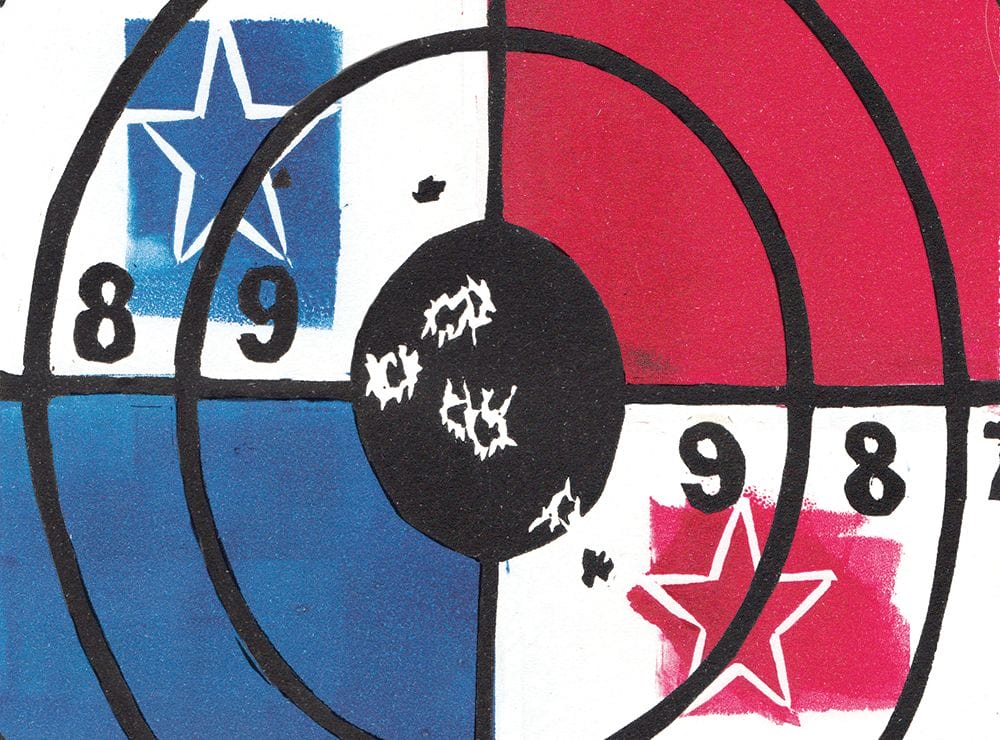
Illustrations: Jade They
1st July 2014 (Taken from: #16)
Just two nights ago, the former hitman tells me, a couple of 17-year-old boys were shot in the head right outside the building we’re in. They were members of the Pentagonal gang. They had crossed the invisible border between their territory and that of Calor Calor. They were spying, he says. And so they were killed. The information is hard to stomach. In the head? Right outside? But for the residents of Santa Ana, a colonial shanty town just east of downtown Panama City, it’s just another day in the barrio. Don’t worry, the former hitman says with a grin, estás seguro conmigo, you’re safe with me. But it’s hard to feel safe here in a neighbourhood where vigilant eyes watch from behind cracks in the clapboards, where children stop dead in their tracks just to stare at you, where gangs with names like Baghdad and Vietnam 23 have spun a deadly web of invisible boundaries, where everyone is potential prey.
Gangs have ripped this country apart. Each morning, newspapers hit the stands with pictures of bloody corpses on the front page. The bodies lie awkwardly in the street, half covered with blood-soaked blankets, marked out with yellow tape, lit by the blue glare from a Policía Nacional car. Bystanders loiter near the scene of the crime, straining for a glimpse of the latest victim. Over the past five years, the problem has metastasised into a national disaster. Five years ago there were only 200 criminal gangs and 1,385 gangsters operating in Panama. By 2013, that number had increased to an estimated 355 gangs and 7,500 gangsters. When the Panameñista administration came to power a few months ago, newly elected president Juan Carlos Varela announced a programme to help clean up the streets. But it hasn’t exactly gone according to plan.
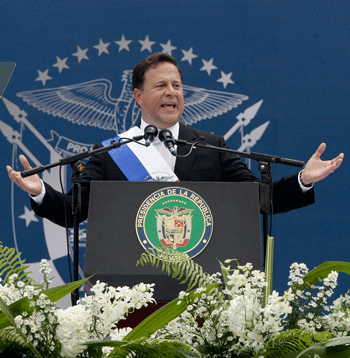
Juan Carlos Varela delivers his inauguration speech. Photo: Arnulfo Franco/AP/Press Association Images
“From today, no one in Panama is above the law,” Varela bellowed during his inauguration speech on 1st July, shortly after being sworn in. Varela shocked the crowd of supporters by offering gang members across the country a month-long amnesty deal. He urged them to “sever links with organised crime and join civic life” and threatened that those who did not participate would be treated with a “firm hand”. Varela called the programme ‘Barrios Seguros’ (‘Safe Neighbourhoods’).
Gangs have ripped this country apart. Each morning, newspapers hit the stands with pictures of bloody corpses on the front page”
It was bold and it was progressive. With gang-related violence spiralling out of control, Varela’s presumption that some gang members were looking for a way out of the fray was correct. Barrios Seguros wasn’t just a get-out-of-jail-free card. Varela also announced integrated job training programmes and intensified social support systems. In what turned out to be the programme’s Achilles’ heel, Varela also promised a bonus of US$45 every month – the equivalent of about 15 hours’ work at minimum wage – to gang members who surrendered firearms upon taking up the offer of an amnesty.
The outlook has always been grim in the ghettos of Santa Ana, San Miguelito, El Chorrillo, Barraza and Boca La Caja – all a stone’s throw away from the vertigo-inducing wealth of downtown Panama City. But over the past few years, the plague of gang violence has shifted westward into the country’s interior. Small cities such as Arraiján, Capira, La Chorrera and David have now become just as dangerous as the capital. The population of the prison system, already bogged down by overcrowding, has jumped by 60 percent in the past couple of years. However Panama tried to fix the gang problem, it didn’t work.
The day after Varela’s surprising inauguration speech, 200 members of the menacing Los Chinches (The Bed Bugs) gang in Chiriquí, near the Costa Rican border, came forward and expressed interest in the disarmament pact and the Barrios Seguros programme. Weeks later, members from Loma Colorada, 20 de Diciembre and Villa La Paz – all ancillary gangs to Los Chinches – turned in a 12-gauge shotgun, two .22-calibre handguns, a .38-calibre pistol, a can of teargas and two homemade explosive devices. In return, the Barrios Seguros liaisons promised the gang members a new minibus to take them and their families to and from church, sports equipment for the children in the neighbourhood and, of course, the $45 monthly bonus. By the end of July, newspapers were reporting that around 1,400 gang members had joined the programme. Things seemed to be going well. So well, in fact, that the president extended the amnesty offer indefinitely.
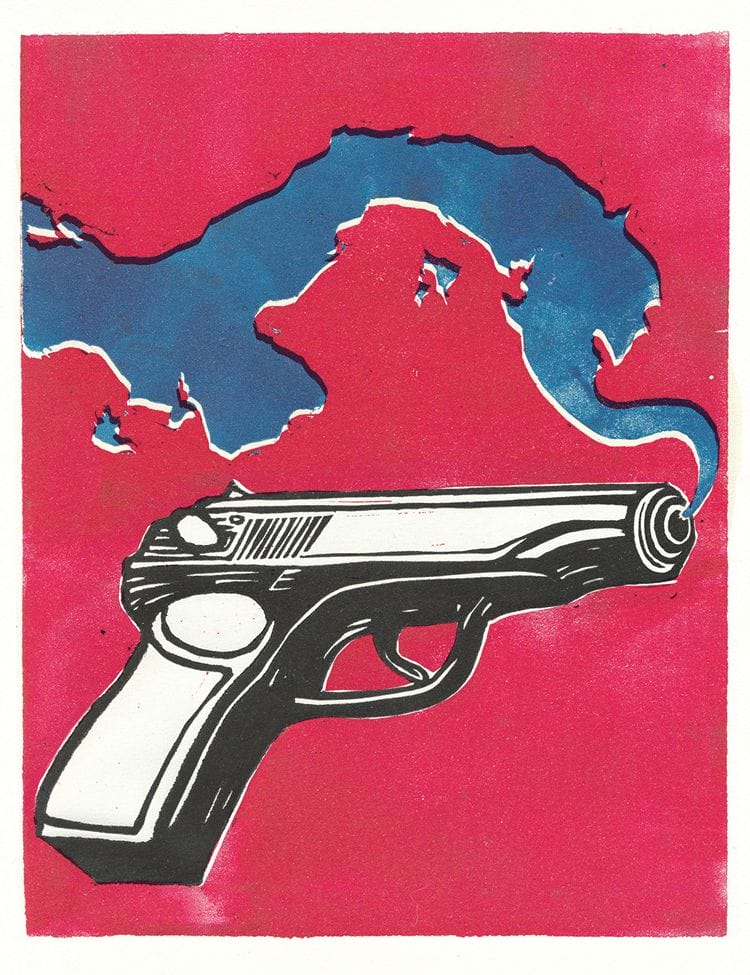
The hitman and her
In Santa Ana, many of the houses don’t even have doors – there is very little inside worth stealing. Inside they are more like barracks than homes. And many of the residents are just squatters. There is a faded colonial style in the elaborate, crumbling balconies and balustrades. Walls are covered in a thousand different colours of peeling paint. Festering garbage lurks on most street corners and couches worn down to their springs lie upside down on the pavements.
Santa Ana, like other slums in the country, almost functions as an autonomous region – a Vatican City of squalor and fear. But pastor Eric Batista, a former hitman, seems to like it here.
On a hit, Batista would dress up as a woman in a sexy red dress, fake breasts and all. He was called La Barbie – a nickname he quite likes”
Batista, 46, is president of Movimiento Antipandillas (The Anti-Gang Movement), a barebones charity operating out of a small, makeshift office on the border between Pentagonal and Calor Calor territory on Calle E. Ten years ago, Batista found God, put down the bullets, picked up a Bible and changed his ways. He’s reformed. And he won’t let you forget it.
Batista is not afraid to talk about his deadly past. In fact, he appears to revel in it. A shred of lingering pride, it seems, mingles with his guilt. He used to be a sicario, a term used to denote assassins in the Latin American drug world. But he wasn’t associated with any one gang. Batista was a freelancer – and a good one, albeit with a bizarre technique. On a job, he would dress up as a woman in a sexy red dress, fake breasts and all. Thus disguised, he’d sneak up on his unsuspecting prey and pull the trigger for $5,000 a pop. His work took him to Mexico City and even Los Angeles. He was called La Barbie – a nickname, he tells me, that he quite likes.
“Barrios Seguros is not the solution,” Batista tells me from across the table in his one-room headquarters. The air is hot and damp. There’s a bathroom on the other side of a concrete wall. It has no door. An open Bible lies on the plastic table between us.
Batista believes the only way to rid the country of gang violence is gradually, through youth-oriented gang prevention. Because the guys who are already in gangs, Batista tells me, son perdidos – they’re lost, gone. Colouring Batista’s bleak perspective is the fact that his 16-year-old son was killed three years ago in a prison fire just days before he was due to be released. He was in prison for gang-related violence.
Batista shows me an 8 x 10 photograph of his son’s charred corpse. Barrios Seguros can’t help gang members, he tells me. More time is required to rehabilitate a career criminal. All that can save those gang members now is what saved La Barbie a decade ago: La Palabra, Batista says, the Word of God.
Pastor Batista isn’t the only one who has vocalised his contempt for Barrios Seguros. The former minister of public security, José Raúl Mulino, believes that the programme is too rushed. Mulino recently told the press that “the average time for effective re-socialisation of gang members cannot be less than one year”. Other critics of the policy warned that endemic corruption in Panamanian politics has left the government far too short of moral authority to successfully impose standards of behaviour on society.
However, the element of Barrios Seguros that really seems to gnaw at people is the ‘salary’, the promised $45 monthly bonus. It’s certainly the element of the programme that seemed to get gang members’ attention – which makes Barrios Seguros a rather polarising issue for the millions of Panamanians trying their hardest to earn an honest living.
Renato Pereira, a criminal lawyer based in Panama City, calls the initiative “legitimised extortion”. On his Twitter account, Pereira wrote: “I know of no civilised country where the state has agreed to pay murderers a wage if they just stop killing.”
But the monthly bonus is responsible for far more damage than just a few heated arguments. By the middle of September, not ten weeks since Varela announced the amnesty deal during his inauguration speech, the Barrios Seguros programme had officially run out of money. Too many gang members had come forward for the Panamanian government’s shallow pockets to support.
On 14th September, before the full national assembly, security minister Rodolfo Aguilera Franceschi revealed that when the amnesty programme was first conceived, the budget required to sustain it had not been set aside. The early-stage participants to come forward could be supported – but later arrivals to the programme would not be so fortunate.
I know of no civilised country where the state has agreed to pay murderers a wage if they just stop killing” – Renato Pereira
The situation escalated into an all-out calamity. Gang members all over the country had been promised job training. They’d been promised money. But the government was failing to deliver. “We are asking President Juan Carlos Varela to stop and see what his officials are actually doing, which is nothing,” one of the gang members told a TV reporter on TVN2. Many of the gangsters who had put themselves forward for the Barrios Seguros scheme returned to the street and rejoined their old gangs.
Soon, the violence was as bad as ever. The Panamanian press began calling the Barrios Seguros programme un barco a la deriva, a ship adrift.
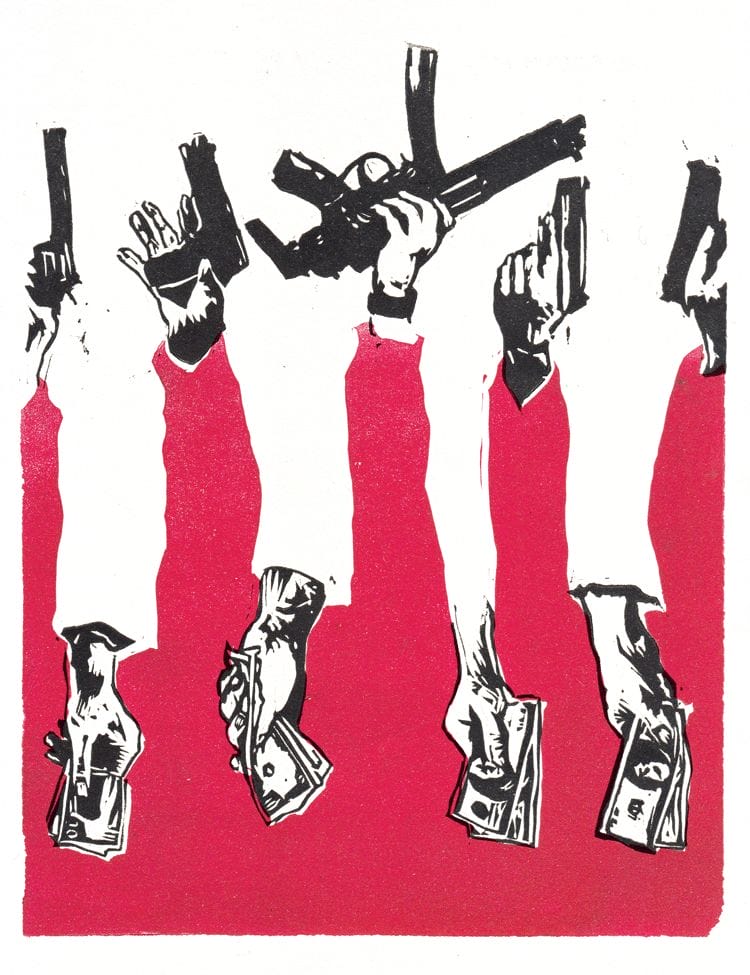
The reality on the streets
There are Los Terroristas, a band of drug dealers and sicarios operating in Villa Escondida, Los Way Way Ghetto running things in Villa La Paz and a pack of hitmen in La Loma who call themselves Los Hijos de Bin Laden (The Sons of Bin Laden). Then there’s Alma Grande (Big Soul) conducting armed robberies in Los Moros, Los Dueños de la Calle (Owners of the Street) dealing drugs in Altamira and arms traffickers in San José who refer to themselves simply as Los Cañones (The Guns). There are Los Killmanjaros, Los Rugrats, Los Sopranos, Los Sicilianos and Patrulla del Terror (The Terror Patrol).
These are just a few of the gangs tyrannising Panamanians from the border of Costa Rica in the west to the Darien jungle in the east. There is no escape, no sanctuary. And after being promised something that never came, gang members who had been looking for a way out were trapped once again.
When it became clear that only the first wave of gang members to sign up for Barrios Seguros would be getting the monthly payment, tensions on the streets started to reignite and gang-on-gang violence became a weekly, sometimes nightly, occurrence. In the village of Juan Díaz, a man, his mother and niece were shot dead in their car after leaving a party in the nearby sector of Ciudad Radial. The following weekend, in the San Antonio district of La Chorrera, a family was gunned down as they entered their house. One victim was nine. Another was four.
Then a wave of violent robberies shook the wealthier parts of the downtown area of Panama City. Men armed with handguns and wearing masks targeted cafes and restaurants known to be popular expat and tourist hangouts. Victims were robbed of jewellery, cash, credit cards, smartphones and laptops. Women were beaten. All these crimes were thought to be connected to organised gangs who had either previously joined, or expressed interest in, Barrios Seguros.
The government’s optimistic take on the situation is at odds with the reality on the streets. “The Barrios Seguros programme is running positively,” the national police commissioner, Omar Pinzon, told the Panamanian newspaper La Estrella in late September. “The programme does not stop at the delivery of the bonus.” Pinzon insisted the programme “involves an induction process for young people, which leads them to take advantage of the opportunities to specialise in a profession that allows them to earn an honest living.”
Manuel, a gang member from El Chorillo, is interested in the prospect of “an honest living”. He entered prison when he was 18 and served a 12-year sentence. He was released six years ago. He is now married and has a two-year-old son at home. Despite all this, Manuel is back running drugs and arms with his old gang, Calor Calor. “Barrios Seguros works well,” he told me. “I know some guys in the programme. They get paid every month and they get good jobs. The programme brings a change to their lives.”
Manuel’s friends were among the lucky few who began receiving bonuses before the well ran dry. But he lost his chance to join. While his chapter of Calor Calor was being considered for the programme, fellow members were involved in a shootout in Barraza, blatantly violating the terms of participation. “Our neighbourhood is no longer being considered,” he says, clearly disappointed. He doesn’t say it outright, but I sense that Manuel would be apprehensive to pursue Barrios Seguros independently, without the rest of Calor Calor.
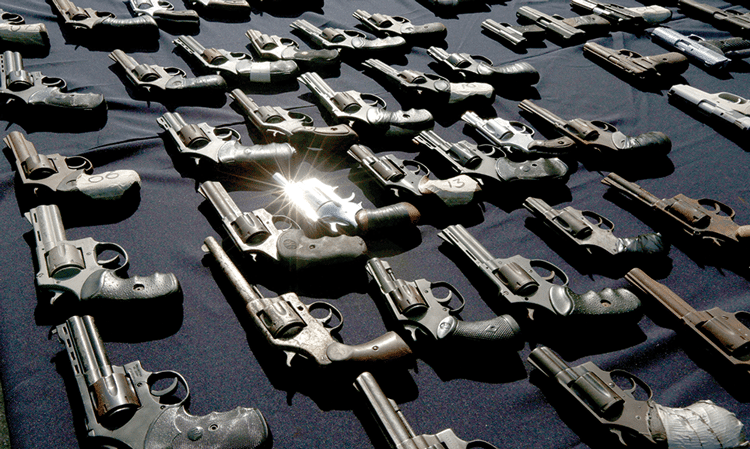
Pistols are displayed by police before their destruction in Panama City, on 6th August 2014. Photo: Arnulfo Franco/AP/Press Association Images
Barrios Seguros in the balance
In 2015, the Ministry of Security plans to allocate upward of US$7 million out of the new administration’s budget to support and reinforce Barrios Seguros – a chunk of cash that the government says will benefit another 3,000 gang members. The security minister said that the new government is also budgeting to spend an additional $38 million over the next five years, and is scheduled to build training centres in Chiriquí, Colón and Panama City.
The government’s PRs are hard at work trying to shore up the perception of the programme. TV newscasts in October featured some 300 Calor Calor and Baghdad gang members from the Arraiján area who had all successfully integrated into Barrios Seguros. They have been going to church. They are enrolled in INADEH, a vocational training institute. They are being trained as electricians, plumbers, tourist guides and beauticians. Some who are learning auto mechanics have already been promised employment with a new car repair company opening up in Arraiján.
On 8th October, President Varela marked his first 100 days in office by addressing the nation. “We will bring to justice all those who insist on a life of crime. To the 1,400 young men who have already decided to join Barrios Seguros, I tell you: you have all taken the right path. The state will open its doors to those like you who want to change their life.” He also had a message for a sceptical public. “I can assure you that we are confronting the gangs and we will beat them.”
President Varela certainly talks a good game, but it remains to be seen if Barrios Seguros – and Varela’s own political career – will be a success or another victim of Panama’s gang culture.
Slow Journalism in your inbox, plus infographics, offers and more: sign up for the free DG newsletter. Sign me up
Thanks for signing up.
